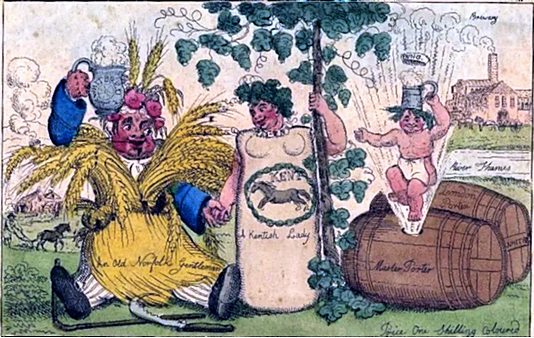
After the Soviet Union disintegrated in 1991, Communism was dead. Or so we were told at the time. However, it should be clear by now that Communism is the John Barleycorn of political ideologies:
They worked their will on John Barleycorn, but he lived to tell the tale.
That is, Communism was thought to have been destroyed, but not only did it survive, it eventually came to dominate those who believed they had destroyed it. (A full-length exegesis on this conceit may be found in my 2008 essay “John Barleycorn Was Dead”.)
The 21st-century version of the victorious ideology is not called “home-brewed ale”, but rather “Progressivism”, or the “New World Order”, or “Global Governance”, among other terms. The process of imposing the new global utopia is, of course, referred to as “the Great Reset”. Which is currently well underway, and will probably be completed before most people realize what is happening.
One of the features of latter-day Communism is that it has always been able to count on a multitude of fellow travellers among the members of the political class in the liberal democracies. The Soviets recruited agents of influence in Western governments and cultural circles, but they really didn’t have to work all that hard to find them; there was always a pool of idealistic intellectuals who were eager to embrace the utopian vision provided by the Socialist Revolution.
Communism is primarily a disease of the intellectuals. The proletariat — the purported beneficiaries of the socialist revolution — are generally indifferent to the allure of progressive utopias. But those who hold multiple advanced degrees are especially attracted to the idea of a glorious future planned and implemented by technocrats. They can draw up detailed plans for the construction of an ideal political economy, but they lack the political power to realize their dreams. Achieving such power tends to consume all their energy for well over half their lives; hence the pursuit of power becomes an end in itself.
The following remarks by Diana West were delivered on October 27 at the Institute of World Politics in a talk entitled “Secrets of the Archives: Reconsidering Research of Bukovsky and Romerstein”. In it she draws extensively on the work of the well-known Soviet dissident Vladimir Bukovsky, who was given access to the archives of Soviet intelligence during the brief interregnum in Russia after the breakup of the USSR. This recording is audio-only, but well worth your time:
In her talk, Diana refers several times to her book American Betrayal, which is available here.

The song performed by Traffic 50 years ago comes to mind, and the lyrics that I can remember are rather apropos. “They dug him down, they harrowed him in, put clods upon his head, and these three men took a solemn oath that John Barleycorn was dead.”
And they let him lie for a very long time, ’til the rains from heaven did fall. Then Little Sir John sprung up his head, and so amazed them all.
So the huntsman he can’t hunt the fox, now so loudly blow upon his horn, and the tinker can’t mend kettle nor pot, without the Little Barleycorn.
How about this as a final verse:
The Elite can’t actively pursue their cause, nor show the populace their scorn, and their bankers can’t let their currencies rot, without fermented barleycorn.
Giggle
Thanks for the post, Ned!